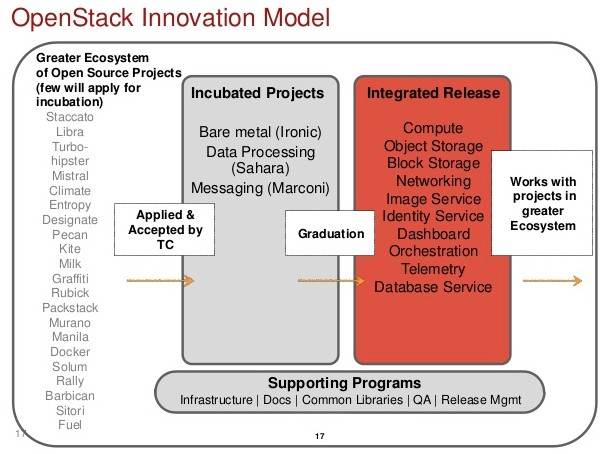OpenStack Gets Enterprise Polish With “Icehouse” Release

Being a relatively young software stack with lots of new features being created by an excited community, OpenStack has to be on a fairly aggressive update cycle, much as the Linux operating system was back in the early days in the late 1990s and early 2000s. OpenStack does releases in April and October, and this time around the "Icehouse" release has been set loose on the datacenters of the world.
Icehouse, which has been six months in the making, is the ninth release of OpenStack since NASA and Rackspace Hosting partnered back in July 2010, merging and open sourcing their respective Nova compute and Swift object storage controllers to create the foundation for OpenStack. The OpenStack Foundation now has 15,900 individual and 347 corporate members, and this release cycle had 1,202 contributors, a 32 percent increase from the prior "Havana" release six months ago. The Icehouse release has around 350 new features that these programmers worked on, as well as 2,902 bugs that were fixed. Red Hat, IBM, HP, Rackspace, Mirantis, SUSE Linux, eNovance, VMware, and Intel were among the top contributors of code in the Icehouse release, along with the employees of the OpenStack Foundation and top OpenStack users Samsung Electronics, Yahoo, and Comcast.
Instead of a blizzard of new capabilities, Icehouse slowed down the creeping featurism and worked on making OpenStack more stable and certifying the code against a wider variety of iron. A big change with Icehouse was the expansion of the continuous integration (what is called CI in the lingo) testing systems for code changes. With Havana, there were four contributors who provided CI testing clusters, and with Icehouse that has risen to 53 companies providing systems to do testing.
The Nova compute controller now has support for limited live upgrades, and this is probably the most important feature of the Icehouse release as far as enterprises are concerned. (You can delve into the release notes for OpenStack Icehouse at this link.) With limited live upgrades, you can upgrade the OpenStack controller nodes first and then live migrate virtual machines off Nova compute nodes and upgrade these without taking the cloud down. Obviously as customers consolidate their clouds they cannot afford such downtime. The Nova module of OpenStack also includes tweaks to improve the performance of its scheduler and the API stack exposes more attributes of the systems so you can, for instance, target workloads to like hardware configurations. The Nova compute and Neutron virtual networking services are now more tightly integrated and the state of both services are maintained as provisioning actions are performed by administrators.
The other interesting new feature with the Icehouse release is the Trove database service, which allows for MySQL relational databases to be exposed as services on the OpenStack cloud. At the moment the open source MySQL database from Oracle as well as the MySQL variant from Percona are supported. Trove has experimental support for MongoDB, Redis, Cassandra, and Couchbase NoSQL databases, and it is not clear when these will be production-grade.
Three of the OpenStack projects that have been in the wild during the Havana release have been promoted to incubated status by the OpenStack technical community. These include the "Sahara" data processing service, which was formerly known as Project Savanna and which aims to automate the process of installing Hadoop on a virtualized cluster. Mirantis, which peddles its own commercial-grade variant of OpenStack, partnered this time last year with Red Hat, which was working on its own OpenStack variant, and Hadoop distributor HortonWorks. Savanna has had its name changed to Sahara, which is funny because VMware has a similar Hadoop virtualization project called Serengeti. The idea with Sahara is to make the combination of OpenStack and Hadoop look and feel more like the Elastic Map Reduce service at Amazon Web Services, which automatically configures nodes and scales capacity up and down as a MapReduce job requires it.
The two other projects that have been promoted to incubator status include the Ironic bare metal server provisioning tool, which is in its first beta inside of Icehouse, and the Marconi messaging service, which is similar in concept to the Simple Queuing Service and Simple Network Service on Amazon Web Service.
All three of these incubated projects are expected to be incorporated with the "Juno" release of OpenStack due this October. These and other issues will be hammered out at the OpenStack Developer Summit in the middle of May in Atlanta.











